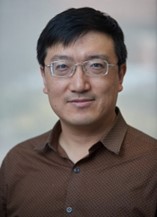Read Max’s Emerging Investigator article ‘FEFOS: a method to derive oxide formation energies from oxidation states‘, DOI: 10.1039/D3CY00107E
1. How do you feel about Catalysis Science & Technology as a place to publish research on this topic?
I find Catalysis Science & Technology to be an excellent journal to disseminate impactful research in the field of catalysis, from fundamental to more applied and technologically relevant studies. This journal has also received increasing attention within the catalysis community, and hence, it has become one of our preferred venues to communicate our research more broadly.
2. What aspect of your work are you most excited about at the moment and what do you find most challenging about your research?
I am extremely excited about this new method (FEFOS) that we have developed to predict formation energies of binary oxides in an interpretable and computationally efficient way. Furthermore, it provides insights into the optimal relative concentration of the different metals in the mixed oxide, which I think may help reduce the cost of state-of-the-art catalysts based on precious metals, as well as to identify new formulations to develop more efficient and cost-effective catalysts.
The next step is to predict formation energies of more complex multimetallic systems, which will allow us to explore a much bigger chemical space and discover new catalytic materials and chemical reactivities.
3. In your opinion, what are the most important questions to be asked/answered in this field of research?
The accurate modelling of oxide materials, particularly those that are magnetic. Addressing this issue under experimental conditions, including the effect of the solvent and/or other species present in the reaction mixture, is particularly challenging. Addressing this issue is of vital importance to rationally design catalytic systems with improved activity, selectivity, and stability. Although there is much work to be done, the field is evolving very rapidly, so I am confident that theoretical predictions will become much more accurate and predictive in the near future.
4. Can you share one piece of career-related advice or wisdom with other early career scientists?
Choose a research field that you are passionate about, try to tackle important questions, and always be open to new ideas and to learn from others working in different fields.
Find out more about Max’s group on their website and Twitter page












